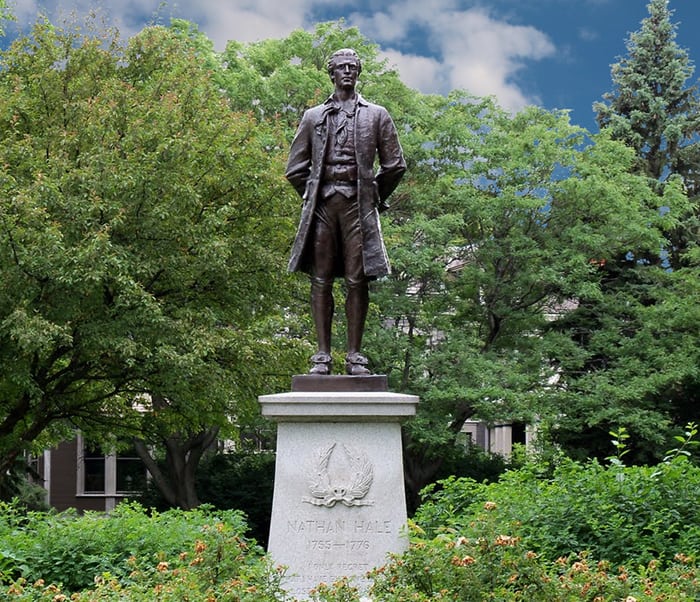
Excerpt from Homegrown Democrat (Viking Penguin, 2004)
I take a seat at a corner table facing the window. A blustery spring
day. The mutter of cars and buses as they pull up to the stop sign.
Western Avenue, once the city limit back when little farms lay
between St. Paul and the milling city of Minneapolis. On the corner
is the old drugstore where F. Scott Fitzgerald came to buy his cigarettes
the summer of 1919 when he was living in his parents’ garret,
a Princeton dropout and failed adman and former lieutenant who
never got in the war. He walked down the street, 22, handsome,
on the wagon, working up the novel that made him famous, This
Side of Paradise. Book and author caught the crest of the Jazz Age
and swept to fame, romance, terrible celebrity, wealth, happiness,
success, insanity, desperation, failure, desperate resolution, vain
hope, sudden death, but when he walked down that sidewalk and
turned the corner at Selby Avenue, he was just a writer engrossed
in the task of trying to turn a loser into a winner. He was born two
blocks from here in 1896. His mother had lost two babies and he
was the third, and from her lavish love sprouted a boy who believed
he could throw the long touchdown pass and win the unattainable
girl, be a war hero, and write the Great American Novel.
St. Paul was a provincial outpost to him, a city of shanty Irish
and potatoheads, a cold colony he would escape and find his way
to Manhattan and Paris and Hollywood and never return here. The
land of bitter winds and smug self-effacing people. And yet when
Fitzgerald said, “My generation of radicals and breakers-down
never found anything to take the place of the old virtues of work
and courage and the old graces of courtesy and politeness,” he was
talking about St. Paul.
When I was still in high school, I walked around this neighborhood
and thought about him. It astonished me to read the opening
of Gatsby and “Winter Dreams” and The Crack-Up and think,
“The man who wrote this grew up a few blocks from Aunt Jean and
Uncle Les’s house.” When Grandpa rode the streetcar to St. Paul
to take out his naturalization papers, the pretty boy in knee pants
and swinging his book strap might have been Fitzgerald. Up and
down the avenues, past the old brick and stone mansions of the
Hills and Griggses and Weyerhaeusers and Ordways, I anguished
in a satisfying way about death, my death, and how nobody ever
would know I had the grand ambitions that I had, poor little me,
dying unknown, unsung, the tiny obituary (STUDENT SUCCUMBS
TO FLU). I used to sit on a little triangle of grass behind a statue of
Nathan Hale, his hands tied behind his back, about to be hanged,
and watch approaching headlights on Summit Avenue and think, in
a satisfying and literary way, about how alone and lost and misunderstood
I was. (In fact, was not: was encouraged by many, found
good teachers wherever I looked, and have been lucky my whole
life.) I looked at a graceful old house and imagined how happy life
would be if only I owned it, a brick palazzo with French doors opening
onto a terrace from which I could extrapolate a life of affection
and amiable conversation. Dark ladies smoking Herbert Tareytons,
their long legs draped over a stone balustrade, speaking in
low, urgent tones about a book, an important book, terribly important,
and their expressive hands map out the New World this book
foresees in the mist, having torn the roof off the old one. I love the
conversation of passionate believers. I was brought up by cautious
people who taught me to make haste slowly, and yet I have always
wanted more than one life, including some passionate ones—a St.
Paul one but also a New York one, and a cowboy life, of course, and
a showbiz one, and a literary one, and a secret life as, say, a singer
in a club in Duluth. I lived a lot of lives vicariously as a reader and
then invented a few lives of my own. When, at the age of forty, I
bought a big green frame house with a porch on Goodrich Avenue,
it only made me restless. I pulled up stakes and moved five blocks
away to a brick house with a walled garden, then jumped to a belle
epoque apartment in Copenhagen where I paced and plotted my
escape, then to Central Park West in New York, then to a log cabin
in a grove of aspens in Wisconsin with a family of wild turkeys who
came and went. And then landed back here in St. Paul, near Nathan
Hale, and here I have stopped.